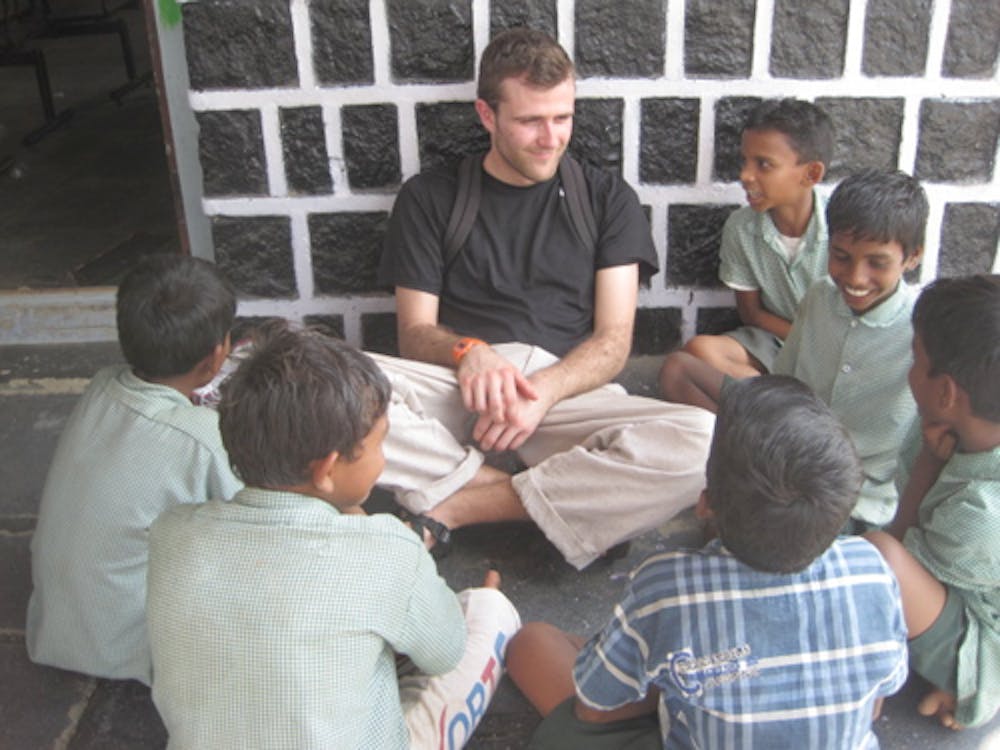17 student nurses spent two weeks in India working with the rural population
Senior Bryant Felton hangs out with school boys in India. Felton, a nursing student, spent two weeks working with the rural population. (Photo courtesy of Julia Evans)
By Kate Stringer, Staff Writer stringer14@up.edu
Dry, mud - stained, fatigued feet were Bryant Felton's key to earning a stranger's trust. At a foot-washing station in India, Felton scrubbed the feet of field workers who spent hours standing in rice fields.
Felton, a senior nursing major, recalls one man found his offer to wash his feet bizarre. It was only after pressure from his friend that the man finally consented.
"After I was done he kissed his hands and then touched my feet," Felton said. "It was nice to see that even though you don't speak the same language as someone, you're connected in doing something nice for them."
Felton is one of 17 nursing majors who traveled to India for two weeks in March to wash feet, conduct clinical assessments and provide health education in the village of Narasaraopet.
This is the second time nursing associate professor Kaye Wilson-Anderson has led a group of UP nursing students and alumni to Narasaraopet.
Many women in Narasaraopet aren't educated about topics like menstruation, fertility or breast health. Additionally, they are unsure of how to care for family members who are sick. In rural India, many girls are subjected to arranged marriages at nine or ten, according to Wilson-Anderson, and are expected to know how to take care of their family.
Health and education
Students worked in a clinic for seven days, serving 2,500 people. They focused on quick assessment and preventative health care treatment.
Felton said one challenge in the clinic was trying to help people change their perspective on health as a long - term process rather than a quick fix.
"People will get frustrated because they're looking for cures. They don't realize health is a long - term thing," he said.
Some clients showed great resiliency while suffering from serious illnesses.
"It's interesting to see how they've lived with chronic diseases and how well they've coped with it," senior Rosemary Moore said.
Students were overwhelmed by the gratitude their clients showed. Senior Ellen Maier recalls helping a client with muscle pain and only being able to give Tylenol to help alleviate it.
"He was smiling and [the translator said] 'He says he's very satisfied with his care here.'" Maier said. "The little help we could give was so much for them."
Senior Jessica Colburn said one frustration was not being able to go "above and beyond" as UP nurses are taught to do.
"Seeing these people and their acute and chronic problems, you want to do everything in your whole power to help them," Colburn said. "That we were constantly reminded by our mentors that we were doing more than we would ever know was very humbling."
Part of the students' work in Narasaraopet involved educating their patients. Students taught women about their menstrual cycles and when the best time to get pregnant is. Students also created non-linguistic cards to instruct women about caring for sick family members who have fever, dehydration or diarrhea.
Seniors Sarah Olson, Whitney Raffle and Aimee Smith also conducted research on female empowerment as a continuation from a class they took in the summer. Part of their reserach analyzed the link between HIV/AIDS and empowerment.
According to Olson, women who knew what HIV/AIDS was did not feel comfortable asking their husbands to wear condoms, even if they knew their husbands had the disease and having sex would make them sick.
"They would say 'It's my fate, that's just how we do it. I want to make my husband happy'," she said.
Olson discovered female empowerment is a huge issue in India when it comes to health.
"You can educate women all day about HIV/AIDS, but if they don't feel empowered they're not going to ask [their husbands to wear condoms]," Olson said.
Students also worked in an orphanage on a project called "Memory Books" started by UP alumna Tamara Faris. Faris created memory books or scrapbooks for children as a way to help with grief and talk about their life and family.
"It's a way for them to share their story about their experiences in life to move through the process of grief," said Moore. "It was a source of identity for them."
Understanding poverty
While students noticed the poverty of Narasaraopet, they were awed by the spiritual wealth of their clients.
"They told us 'You're going to be shocked by the poverty,' but I never was," Moore said. "They [the clients] had the biggest smile and they want to talk to you, open up to you, share their life with you. They are so beautiful and so happy."
Maier found the culture of Narasaraopet inspiring.
They taught us a whole new perspective on life," Maier said.
Wilson-Anderson hopes her students realize their gifts as well as the gifts they received from their clients.
"Not only do we have a lot to give, but we have a lot to gain from them," she said. "In America, we're all about things and getting more stuff and we're still not happy. If anything, I want my students to [realize] that through giving you gain way more than you ever give."








